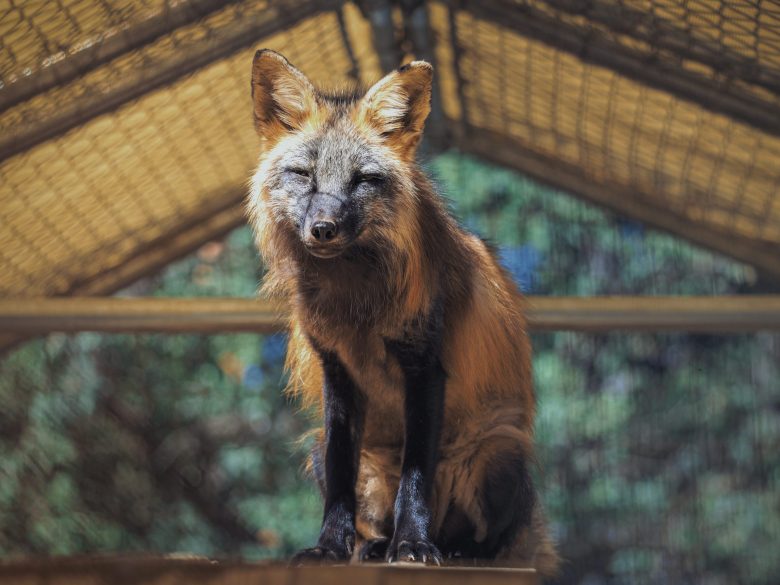After enduring a yearlong journey to safety through claustrophobic cages, combat zones, and a missile strike, four Russian foxes have made it safely to their new home in San Diego County.
Animal conservationist Amy Bassett vowed to be the mother bear for four endangered newborn foxes when she first learned that they were living in small cages at a research facility in the heart of Siberia.
She promised to bring them to her wildlife paradise, the Judith A. Bassett Canid Education and Conservation Center in Santa Ysabel, in order to preserve them before the institution may put them to death.
Bassett has previously rescued a dozen foxes similar to the quartet. However, she had no idea that the reunion of Alexei, Anya Besha, Lyudmila, and Valentina Maria would turn into a year-long battle that would trap her and the foursome in an Iranian missile strike and a geopolitical chess match.
Nevertheless, she persisted, and Bassett fulfilled her pledge on July 4. Now that they were at their new home, the foxes could run, play, and live their lives without being confined to a little cage.
Bassett stated that no man is left behind. We assured these four that we would provide them with a permanent home and a meaningful existence.
Considering that they might be killed if I failed at any point, I felt compelled to keep my word to them.
Route to rescue
Two weeks ago, Bassett believed the difficult part was finished when her foxes boarded their aircraft from Moscow to their new home in California.
She had successfully gained her foxes a route to safety after a year of battling the shipping restrictions that Russia and the United States had put at one another.
Then the rockets began to fall. Bassett knew the instant they did.The foxes spent days in tiny cages during the lengthy voyage from Moscow to California. The flight took a lot longer than anticipated because of Iran’s missile attack on Qatar. (Image courtesy of Johnny Devecka)
She had been following the fox’s flight all night, seeing the tiny dot get closer and closer to her. The aircraft was scheduled to make a stopover in Qatar.
However, on June 23, Iran landed more than a dozen missiles on a U.S. military facility close to Qatar’s normally peaceful capital city of Doha as the airliner approached the gulfside nation.
As she looked helplessly at the flight tracker, Bassett remembered thinking, “My foxes are literally flying in the air to Qatar.” At that time, we had no idea what would happen to them.
Although the foxes arrived in Qatar safely, the adventure was far from ended.
Because of the missiles, officials were preventing any flights from leaving Qatar, so the foxes waited for their demise in tiny containers devoid of water. When Bassett learned, everything was different.
Bassett remarked, “I was Mama Bear screaming at everyone from Qatar, everyone, everywhere.”
The foxes’ quest for freedom resumed the following day when Qatar’s airspace opened again. They returned home for the first time two days later.
New home
When the foxes eventually touched down at Los Angeles International Airport, Bassett saw them for the first time; they were thin and frightened, and there were strangers all around them.
Because of the continuous conflict between Russia and Ukraine, Bassett had never been able to meet the foxes in Siberia during the entire year she had been fighting for them. Once they met, however, Bassett wasn’t a stranger to the four foxes for very long.
Researchers have trained a rare breed of Russian fox known as the quartet to prefer interacting with people. Russian tamed foxes behave almost like amiable lap dogs, in contrast to the cunning, flighty, and cunning archetypes that foxes usually adopt in fairy tales and folklore.
As Bassett and her crew provide them with the love, time, and space they need to heal from their lifetimes of being cut off from human contact, the foursome has slowly started to emerge out of their shells in the two weeks since they relocated to California.
Get neighborhood news in your inbox. It’s free and enlightening.
Become one of the 20,000+ individuals who receive breaking news alerts and the Times of San Diego in their inbox every day at 8 a.m.
Weekly updates from San Diego communities have also been provided! You acknowledge and agree to the terms by clicking “Sign Up.” Choose from the options below.
The foxes may eventually be able to play and engage with the public, which is what they love most, after they have recovered for a few months. The foursome can then participate in the hands-on meet and greets at the conservation center, where San Diegans can pet, play, watch, and learn about Russian domesticated foxes.
For the time being, however, the foxes are simply content with their new home and the countless toys, food, cuddles, and affection that Bassett and her staff provide them.
Bassett stated, “We’ll just see how their personalities begin to shine and come out.” They express their desires to us.
According to its website, the conservation organization is presently accepting donations from the general public to construct larger enclosures for the foxes.
The four foxes can also be sponsored by members of the public, who will cover the cost of their food, toys, treats, and veterinary care. The cost of sponsorships varies from $50 per month to $450 per year.

 by
by 

